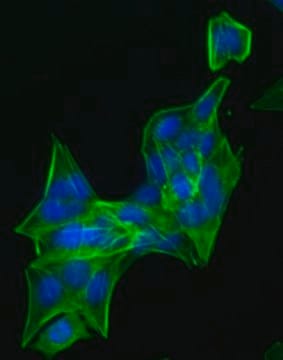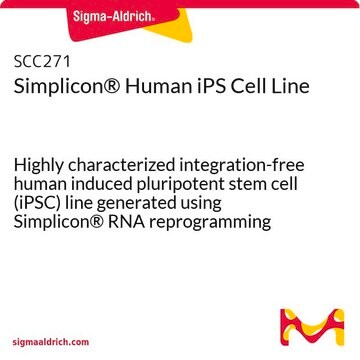SCC487
CNS-1 Rat Glioma Cell Line
Rat
Iniciar sesiónpara Ver la Fijación de precios por contrato y de la organización
About This Item
UNSPSC Code:
41106514
NACRES:
NA.81
Productos recomendados
product name
CNS-1 Rat Glioma Cell Line,
biological source
rat
Quality Level
packaging
vial of ≥1X10⁶ cells/vial mg
manufacturer/tradename
Millipore
growth mode
N/A
technique(s)
cell analysis: suitable
shipped in
liquid nitrogen
storage temp.
−196°C
Application
Each vial contains ≥1X10⁶ viable cells.Cells are tested negative for infectious diseases by a Rat/Mouse Essential CLEAR Panel by Charles River Animal Diagnostic Services.Cells are verified to be of rat origin and negative for inter-species contamination from mouse, human, Chinese hamster, Golden Syrian hamster, and Non-human Primate (NHP) as assessed by a Contamination Clear panel by Charles River Animal Diagnostic ServicesCells are negative for mycoplasma contamination.
Glioma is one of the most common brain tumors and is highly aggressive and resistant to standard treatments. Immunotherapy is one of the more promising treatment options since the discovery of lymphatics in the central nervous system allows for penetration of the blood-brain barrier (1). Cellular models that both recapitulate in vivo characteristics of gliomas and are amenable to immunotherapeutic modalities are thus of great value in advancing understanding of gliomas and their potential treatment.The CNS-1 rat glioma cell line is a well-established model that closely mimics the invasive behavior and growth characteristics of human gliomas (2). CNS-1 cells are derived from an N-nitroso-N-methylurea-induced intracranial tumor of a male Lewis rat and are histocompatible with this inbred rat strain, facilitating a range of in vivo studies. Tumors derived from injection of CNS-1 cells display diffuse infiltrative patterns similar to human glioblastoma multiforme (2,3). CNS-1 cells are positive for glial fibrillary acid protein (GFAP), retinoic acid receptor α, and neural cell adhesion molecule NCAM-140 (2,4). CNS-1 cells exhibit multiple chromosome loss and rearrangements reflecting genetic instability common in many human gliomas (2). CNS-1 rat glioma cells are a highly relevant model with wide applications for glioma immunotherapies.CNS-1 cell line originated from an N-nitroso-N-methylurea-induced intracranial tumor of a male Lewis rat (1). 1. Cancer Lett 2020, 476: 1-12.2. J Neurooncol 1994, 22(3): 191-200.3. J Neurooncol 2009, 94(3): 299-312.4. Cancer Res 1998, 58(9): 2020-2028.
Features and Benefits
CNS-1 rat glioma cells are a highly relevant model with wide applications for glioma immunotherapies.
Storage and Stability
Store in liquid nitrogen. The cells can be cultured for at least 10 passages after initial thawing without significantly affecting the cell marker expression and functionality.
Other Notes
This product is intended for sale and sold solely to academic institutions for internal academic research use per the terms of the “Academic Use Agreement” as detailed in the product documentation. For information regarding any other use, please contact licensing@emdmillipore.com.
Disclaimer
Unless otherwise stated in our catalog or other company documentation accompanying the product(s), our products are intended for research use only and are not to be used for any other purpose, which includes but is not limited to, unauthorized commercial uses, in vitro diagnostic uses, ex vivo or in vivo therapeutic uses or any type of consumption or application to humans or animals.
related product
Referencia del producto
Descripción
Precios
Storage Class
10 - Combustible liquids
wgk_germany
WGK 2
flash_point_f
Not applicable
flash_point_c
Not applicable
Certificados de análisis (COA)
Busque Certificados de análisis (COA) introduciendo el número de lote del producto. Los números de lote se encuentran en la etiqueta del producto después de las palabras «Lot» o «Batch»
¿Ya tiene este producto?
Encuentre la documentación para los productos que ha comprado recientemente en la Biblioteca de documentos.
Nuestro equipo de científicos tiene experiencia en todas las áreas de investigación: Ciencias de la vida, Ciencia de los materiales, Síntesis química, Cromatografía, Analítica y muchas otras.
Póngase en contacto con el Servicio técnico








